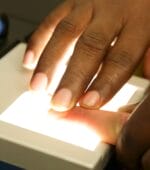Those who are cut out for sales typically achieve immense success when they possess the drive to succeed.
Recent Posts
-

Four Personality Traits of Successful Salespeople
-

Pros and Cons of Digital vs. Ink Fingerprinting
If you’re applying for a medical license in a state that requires fingerprints, you essentially have two options: the ink method and digital fingerprinting.
-

‘I Want Them to Get to Know Me’: How Michael Nich Became Barton Associates’ Most Successful Account Executive
Nich holds the record for the highest sales of any Barton Associates employee in the company’s history—an accomplishment that recently earned him the honor of being named the inaugural inductee in the Barton Associates Hall of Fame.
-

Are Sales Jobs Worth It?: 4 Reasons to Work a Sales Job
At Barton, you’ll create meaningful relationships with your clients and providers to help patients across the country access the quality healthcare services they deserve.
-

Amanda Berg, DMS, PA-C, Named Barton Associates’ 2024 Locum Tenens Physician Assistant of the Year
This inaugural award, presented annually during PA Week (Oct. 6–12), recognizes one PA who has demonstrated exceptional commitment to their profession and patients.
-

2024 Locum Tenens Physician Assistant of the Year: Amanda Berg, DMS, PA-C
“I’m so honored to have been selected for this award,” Berg said about being named Barton’s 2024 Locum Tenens Physician Assistant of the Year.
-

The Ultimate Downloadable Sample Resume
As a staffing firm, we know plenty about the hiring process, and can help you create a brilliant resume based on our free resume template.
-

Barton Associates Named Healthcare Staffing and Recruiting Company of the Year 2024
The recognition showcases Barton Associates’ position in the industry as a trusted partner for locum tenens staffing solutions as healthcare facilities across the country continue to struggle with a shortage of physicians.
-

Much More than the Strip: Fun Things to Do in Las Vegas, Nevada
There’s much more to Las Vegas than this well-known tourist destination.
-

Barton Associates Hall of Fame: Senior Account Executive Michael Nich’s Story of Outstanding Achievement
Michael Nich recently became the inaugural inductee of the Barton Associates Hall of Fame.










